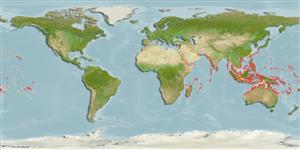Common names from other countries
Environment: milieu / climate zone / depth range / distribution range
Sinh thái học
Biển; Thuộc về nước lợ Cùng sống ở rạn san hô; Mức độ sâu 1 - 30 m (Ref. 1602). Tropical; 30°N - 28°S, 32°E - 139°W
Indo-Pacific: East Africa to the Tuamoto and Austral islands, north to the Ryukyu Islands, south to New Caledonia.
Length at first maturity / Bộ gần gũi / Khối lượng (Trọng lượng) / Age
Maturity: Lm ?, range 26 - ? cm
Max length : 45.0 cm TL con đực/không giới tính; (Ref. 9710)
Các tia vây lưng cứng (tổng cộng) : 9; Các vây lưng mềm (tổng cộng) : 10; Tia cứng vây hậu môn: 3; Tia mềm vây hậu môn: 8. This species is distinguished by the following characters: body moderately deep, its depth 2.3-2.6 times in standard length; dorsal profile of head convex; anterior tip of snout forming an acute angle; jaws prominent, 2 strong canines situated anteriorly in each jaw; no enlarged tooth present of rear of upper jaw. D IX,10, the spines and anterior soft rays of similar length; A III,8; pectoral fins with ii unbranched and 10 branched rays; pelvic fins long, reaching anus in small fish, well beyond in adults; centre of caudal fin rounded in adults, with the upper and lower rays forming elongate lobes giving the fin a trilobed appearance; lateral line interrupted below posterior portion of dorsal-fin base, with a total of 22-23 pored scales; scales reaching well onto bases of dorsal and anal fins; scales in front of dorsal fin extending forward to above centre of eye; cheek and opercle scaly; lower jaw without scales. Colour of the body variably pigmented from green to brown with mottled purple and red markings; 4 vertical dark bars on body that are often indistinct on large individuals; head with numerous small red spots; red lines radiating from anterior and posterior of eye; scales on sides each with a vertical, slightly curved red line; dorsal, anal, and pectoral fins yellow or green with distal red streaks; caudal fin green with a red posterior margin; juveniles with 3-4 dark spots midlaterally on sides and more prominent dark bars. This species capable of rapid colour changes (Ref. 9823).
Adults inhabit lagoon and seaward reefs at depths of 1 to over 30 m, and relatively common along shallow reef margins with good coral cover (Ref. 9710). Usually solitary (Ref. 5213). Feed mainly on shelled benthic invertebrates such as mollusks and crustaceans, but occasionally take fishes (Ref. 1602). Oviparous, distinct pairing during breeding (Ref. 205). Difficult to approach (Ref. 9710). Juveniles secretive on algae reefs and usually around stinging hydrozoans (Ref. 48636).
Life cycle and mating behavior
Maturities | Sự tái sinh sản | Spawnings | Egg(s) | Fecundities | Ấu trùng
Oviparous, distinct pairing during breeding (Ref. 205).
Westneat, M.W., 2001. Labridae. Wrasses, hogfishes, razorfishes, corises, tuskfishes. p. 3381-3467. In K.E. Carpenter and V. Niem (eds.) FAO species identification guide for fishery purposes. The living marine resources of the Western Central Pacific. Vol. 6. Bony fishes part 4 (Labridae to Latimeriidae), estuarine crocodiles. FAO, Rome. (Ref. 9823)
IUCN Red List Status (Ref. 130435)
CITES (Ref. 128078)
Not Evaluated
Threat to humans
Harmless
Human uses
Các nghề cá: buôn bán nhỏ; Bể nuôi cá: Tính thương mại
Các công cụ
Special reports
Download XML
Các nguồn internet
Estimates based on models
Preferred temperature (Ref.
115969): 25.2 - 29.3, mean 28.4 (based on 3095 cells).
Phylogenetic diversity index (Ref.
82804): PD
50 = 0.5078 [Uniqueness, from 0.5 = low to 2.0 = high].
Bayesian length-weight: a=0.02239 (0.01578 - 0.03176), b=2.95 (2.85 - 3.05), in cm Total Length, based on LWR estimates for this species (Ref.
93245).
Mức dinh dưỡng (Ref.
69278): 3.9 ±0.2 se; based on diet studies.
Thích nghi nhanh (Ref.
120179): Trung bình, thời gian nhân đôi của chủng quần tối thiểu là 1.4 - 4.4 năm (Preliminary K or Fecundity.).
Fishing Vulnerability (Ref.
59153): Low to moderate vulnerability (35 of 100).
